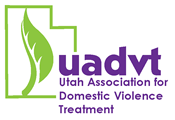Proposed Standards for Domestic Violence Offender Intervention
Proposed Utah Clinician Requirements
PDF download of the below information
“What services are subsidized by the Utah Department of Human Services for people impacted by domestic or intimate partner violence?”
Per Utah statute 51-9-406, the Victims of Domestic Violence Services Account was established to ensure that a portion of the surcharges paid on all criminal fines, penalties, and forfeitures imposed by the courts. This funding is passed through the Division of Child and Family Services to qualified contracted providers throughout the state to support the needs of people impacted by domestic violence.
Contracted providers currently are able to obtain reimbursement for behavioral healthcare provided to child and adult survivors of domestic violence, and for offender evaluations, and group and individual intervention services. When a survivor or offender is in need of these services, and a financial barrier limits access to care, the regional DCFS DV Coordinator may approve a limited amount of subsidy to improve access to essential care, improving safety and stability throughout the family and community. To contact the Regional DCFS DV Coordinator in your area, call 800.897.LINK.
“How does my agency obtain a contract with the Utah Department of Human Services/DCFS to provide these services to people impacted by domestic or intimate partner violence?”
Step Two: OBTAIN THE APPROPRIATE, SPECIALIZED TRAINING Per Utah Administrative Rule R501-21-5 and R501-21-6 professionals providing domestic violence services shall complete specialized* training in domestic violence assessment and treatment practices as outlined below:
-
Before providing treatment services therapists shall have 24 hours of pre-service training specific to domestic violence. This training shall have been completed within the last two years.
The UADVT provides preservice training for mental health professionals who provide interventions to people who are dealing with the effects of domestic violence.
Prior to working with this population, there is suggested/required training.- We provide 24 hours of pre-service training specific to offender treatment interventions.
- We have a list of endorsed pre-service trainings available from the STEW committee available upon request from deb.comstock@gmail.com for those providers working with survivors (adult/child/youth) of domestic violence.
- As of January 2018, we will also be providing a 24 hour preservice training for mental health professionals working with survivors that will satisfy the trauma informed portion of the DHS contract.
- We do not provide the Campbell Danger Assessment Certification. That is available, for a fee, at: http://www.dangerassessment.org/traingin options.aspx
- We do not provide the Columbia Suicide Severity Rating Scale Certification. That training can be accessed at: http://cssrs.columbia.edu/clinical_practice.html
- All DV professionals are required to keep records of their 24 hours of pre-service or 24 hours of trauma informed training in their agency or private personnel files.
-
Therapists shall obtain 16 approved CEU's (Continuing Education Units) related to domestic violence annually thereafter.
DV Professionals are required to have 16 hours of ongoing training specific to DV on a yearly basis.For ongoing training, the UADVT provides:- 16 or more hours of DV training at our annual conference for those professionals working with DV offenders.
- A list of endorsed trainings for those professional working with DV survivors in a mental health capacity, available upon request from: deb.comstock@gmail.com
All DV professionals are required to keep records of their 16 hours of offender intervention training and/or 16 hours of trauma informed training in their agency or private personnel files.
Efforts have been made to make sure this information is up to date with DHS/DCFS contracting requirements. If you have questions about certification, please refer to your contract representative or Brian Parnell at the DCFS State office, bparnell@utah.gov.
*Specialized training means accredited training specific to the type of services the clinician provides to people impacted by domestic violence. For example--Clinicians who aim to provide court-ordered evaluations for people adjudicated on domestic violence charges, must be trained in conducting offender evaluations. Clinicians who aim to provide trauma-informed behavioral health care to child survivors of domestic violence, must be trained in providing behavioral healthcare to children with a trauma history. If a clinician wants to provide group offender intervention services to high risk offenders, training should be focused in this area. For a list of training resources, please visit http://sss.uadvt.org.
Step Three: GET LICENSED AS AN AGENCY In order to bid on a Utah Department of Human Services DCFS contract to provide outpatient services to people impacted by domestic or intimate partner violence, your agency must obtain a license from the Utah Department of Human Services Office of Licensing. Submit your agency application, fee, and an electronic copy of your Policy and Procedure manual directly to the Office of Licensing at http://hslic.utah.gov. The agency’s Policy and Procedure Manual must address the specifics of how the program will comply with the Core Rules (R501-2) and with the Categorical Rules for outpatient treatment with an emphasis in domestic violence. Be sure to include program statement of purpose; description for services to be provided; description of clients to be served.
Step Four: Agencies interested in obtaining the DCFS DV Services Contract should contact Brooke St John at bstjohn@utah.gov


